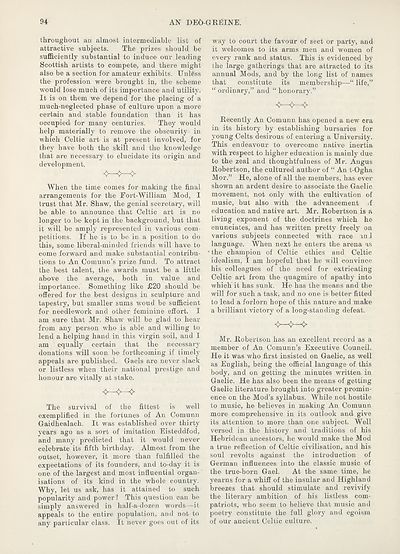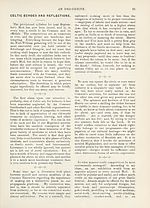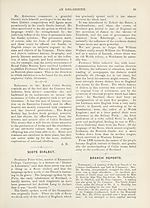An Comunn Gàidhealach Publications > Deo-gréine > Volume 17, October 1921 to September 1922
(102) Page 94
Download files
Complete book:
Individual page:
Thumbnail gallery: Grid view | List view

u
AN DEO-GREINE.
throughout an almost intermediable list of
attractive subjects. The prizes should be
sufficiently substantial to induce our leading
Scottish artists to compete, and there might
also be a section for amateur exhibits. Unlfess
the profession were brought in, the scheme
would lose much of its importance and utility.
It is on them we depend for the placing of a
much-neglected phase of culture upon a more
certain and stable foundation than it has
occupied for many centuries. They would
help materially to remove the obscurity in
which Celtic art is at present involved, for
they have both the skill and the knowledge
that are necessary to elucidate its origin and
development.
When the time comes for making the final
arrangements for the Eort-William Mod, I
trust that Mr. Shaw, the genial secretary, will
be able to announce that Celtic art is no
longer to be kept in the background, but that
it will be amply represented in various com¬
petitions. If he is to be in a position to do
this, some liberal-minded friends will have to
come forward and make substantial contribu¬
tions to An Comunn’s prize fund. To attract
the best talent, the awards must be a little
above the average, both in value and
importance. Something like £20 should be
offered for the best designs in sculpture and
tapestry, but smaller sums woud be sufficient
for needlework and other feminine effort. I
am sure that Mr. Shaw will be glad to hear
from any person who is able and willing to
lend a helping hand in this virgin soil, and I
am equally certain that the necessary
donations will soon be forthcoming if timely
appeals are published. Gaels are never slack
or listless when their national prestige and
honour are vitally at stake.
The survival of the fittest is well
exemplified in the fortunes of An Comunn
Gaidhealach. It was established over thirty
years ago as a sort of imitation Eisteddfod,
and many predicted that it would never
celebrate its fifth birthday. Almost from the
outset, however, it more than fulfilled the
expectations of its founders, and to-day it is
one of the largest and most influential organ¬
isations of its kind in the whole country.
Why, let us ask, has it attained to such
popularity and power? This question can be
simply answered in half-a-dozen words—it
appeals to the entire population, and not to
any particular class. It never goes out of its
way to court the favour of sect or party, and
it welcomes to its arms men and women of
every rank and status. This is evidenced by
the large gatherings that are attracted to its
annual Mods, and by the long list of names
that constitute its membership-—“ life,”
“ ordinary,” and “ honorary.”
Recently An Comunn has opened a new era
in its history by establishing bursaries for
young Celts desirous of entering a University.
This endeavour to overcome native inertia
with respect to higher education is mainly due
to the zeal and thoughtfulness of Mr. Angus
Robertson, the cultured author of “ An t-Ogha
Mor.” He, alone of all the members, has ever
shown an ardent desire to associate the Gaelic
movement, not only with the cultivation of
music, but also with the advancement -f
education and native art. Mr. Robertson is a
living exponent of the doctrines which he
enunciates, and has written pretty freely on
various subjects connected with race ml
language. When next he enters the arena as
• the champion of Celtic ethics and Celtic
idealism, I am hopeful that he will convince
his colleagues of the need for extricating
Celtic art from the quagmire of apathy into
which it has sunk. He has the means and the
will for such a task, and no one is better fitted
to lead a forlorn hope of this nature and make
a brilliant victory of a long-standing defeat.
Mr. Robertson has an excellent record as a
member of An Comunn’s Executive Council.
He it was who first insisted on Gaelic, as well
as English, being the official language of this
body, and on getting the minutes written in
Gaelic. He has also been the means of getting
Gaelic literature brought into greater promin¬
ence on the Mod’s syllabus. While not hostile
to music, he believes in making An Comunn
more comprehensive in its outlook and give
its attention to more than one subject. Well
versed in the history and traditions of his
Hebridean ancestors, he would make the Mod
a true reflection of Celtic civilisation, and his
soul revolts against the introduction of
German influences into the classic music of
the true-born Gael. At the same time, he
yearns for a whiff of the insular and Highland
breezes that should stimulate and revivify
the literary ambition of his listless com¬
patriots, who seem to believe that music and
poetry constitute the full glory and egoism
of our ancient Celtic culture.
AN DEO-GREINE.
throughout an almost intermediable list of
attractive subjects. The prizes should be
sufficiently substantial to induce our leading
Scottish artists to compete, and there might
also be a section for amateur exhibits. Unlfess
the profession were brought in, the scheme
would lose much of its importance and utility.
It is on them we depend for the placing of a
much-neglected phase of culture upon a more
certain and stable foundation than it has
occupied for many centuries. They would
help materially to remove the obscurity in
which Celtic art is at present involved, for
they have both the skill and the knowledge
that are necessary to elucidate its origin and
development.
When the time comes for making the final
arrangements for the Eort-William Mod, I
trust that Mr. Shaw, the genial secretary, will
be able to announce that Celtic art is no
longer to be kept in the background, but that
it will be amply represented in various com¬
petitions. If he is to be in a position to do
this, some liberal-minded friends will have to
come forward and make substantial contribu¬
tions to An Comunn’s prize fund. To attract
the best talent, the awards must be a little
above the average, both in value and
importance. Something like £20 should be
offered for the best designs in sculpture and
tapestry, but smaller sums woud be sufficient
for needlework and other feminine effort. I
am sure that Mr. Shaw will be glad to hear
from any person who is able and willing to
lend a helping hand in this virgin soil, and I
am equally certain that the necessary
donations will soon be forthcoming if timely
appeals are published. Gaels are never slack
or listless when their national prestige and
honour are vitally at stake.
The survival of the fittest is well
exemplified in the fortunes of An Comunn
Gaidhealach. It was established over thirty
years ago as a sort of imitation Eisteddfod,
and many predicted that it would never
celebrate its fifth birthday. Almost from the
outset, however, it more than fulfilled the
expectations of its founders, and to-day it is
one of the largest and most influential organ¬
isations of its kind in the whole country.
Why, let us ask, has it attained to such
popularity and power? This question can be
simply answered in half-a-dozen words—it
appeals to the entire population, and not to
any particular class. It never goes out of its
way to court the favour of sect or party, and
it welcomes to its arms men and women of
every rank and status. This is evidenced by
the large gatherings that are attracted to its
annual Mods, and by the long list of names
that constitute its membership-—“ life,”
“ ordinary,” and “ honorary.”
Recently An Comunn has opened a new era
in its history by establishing bursaries for
young Celts desirous of entering a University.
This endeavour to overcome native inertia
with respect to higher education is mainly due
to the zeal and thoughtfulness of Mr. Angus
Robertson, the cultured author of “ An t-Ogha
Mor.” He, alone of all the members, has ever
shown an ardent desire to associate the Gaelic
movement, not only with the cultivation of
music, but also with the advancement -f
education and native art. Mr. Robertson is a
living exponent of the doctrines which he
enunciates, and has written pretty freely on
various subjects connected with race ml
language. When next he enters the arena as
• the champion of Celtic ethics and Celtic
idealism, I am hopeful that he will convince
his colleagues of the need for extricating
Celtic art from the quagmire of apathy into
which it has sunk. He has the means and the
will for such a task, and no one is better fitted
to lead a forlorn hope of this nature and make
a brilliant victory of a long-standing defeat.
Mr. Robertson has an excellent record as a
member of An Comunn’s Executive Council.
He it was who first insisted on Gaelic, as well
as English, being the official language of this
body, and on getting the minutes written in
Gaelic. He has also been the means of getting
Gaelic literature brought into greater promin¬
ence on the Mod’s syllabus. While not hostile
to music, he believes in making An Comunn
more comprehensive in its outlook and give
its attention to more than one subject. Well
versed in the history and traditions of his
Hebridean ancestors, he would make the Mod
a true reflection of Celtic civilisation, and his
soul revolts against the introduction of
German influences into the classic music of
the true-born Gael. At the same time, he
yearns for a whiff of the insular and Highland
breezes that should stimulate and revivify
the literary ambition of his listless com¬
patriots, who seem to believe that music and
poetry constitute the full glory and egoism
of our ancient Celtic culture.
Set display mode to:
![]() Universal Viewer |
Universal Viewer | ![]() Mirador |
Large image | Transcription
Mirador |
Large image | Transcription
| An Comunn Gàidhealach > An Comunn Gàidhealach Publications > Deo-gréine > Volume 17, October 1921 to September 1922 > (102) Page 94 |
|---|
| Permanent URL | https://digital.nls.uk/127171197 |
|---|
| Description | Leabhar 17, Treasamh Mios an Fhoghair 1921 gu Dara Mìos an Fhoghair 1922 |
|---|---|
| Attribution and copyright: |
|
| Description | This contains items published by An Comunn, which are not specifically Mòd-related. It includes journals, annual reports and corporate documents, policy statements, educational resources and published plays and literature. It is arranged alphabetically by title. |
|---|
| Description | A collection of over 400 items published by An Comunn Gàidhealach, the organisation which promotes Gaelic language and culture and organises the Royal National Mòd. Dating from 1891 up to the present day, the collection includes journals and newspapers, annual reports, educational materials, national Mòd programmes, published Mòd literature and music. |
|---|---|
| Additional NLS resources: |
|

